Do you know which household items are most likely to endanger your pets? If you are faced with a pet poisoning the first thing you need to do is call the Pet Poison Help Line at 855-764-7661. There will be a $65 fee. This service is staffed with credentialed veterinary professionals who will gather information regarding the exposure. Calculations will be run to determine if your pet is safe at home or will need to be seen by a veterinarian. If veterinarian care is needed, they will work together with your veterinarian to develop a treatment plan specific to your pet.
Pet poisoning symptoms are vomiting, diarrhea, hyper-activity, drooling, shock, muscle tremors, seizures, coma, renal failure, chemical burns and depression.
Do not give your pet water because it may cause your pet’s system to digest the poison quicker.
Here is a list of common household pet poisons:
Alcohol, avocados, caffeine, chocolate, garlic, grapes, gum, onions, peach pits, raisins, walnuts, macadamia nuts, acetaminophen (Tylenol), Ibuprofen, naproxen (Advil and Aleve) and prescription drugs.
Over the counter flea and medications can be very toxic if too much is given to a dog or a dog digests it.
Household cleaners, bleach, antifreeze and paint thinner.
Household plants: Lilies, Sago Palm, Azalea/Rhododendron, Oleander, Tulips/Narcissus bulbs, Marijuana, English Ivy, Chrysanthemum, Pothos, Peace Lily, Schefflera, Autumn Crocus, Yew, Kalanchoe, Cyclamen, Amaryllis, and Caster Bean.
Always remember that time is of the essence. If your pet is cared for immediately to induce vomiting it could save your pet’s life. However, if your pet digests something very toxic, vomiting may not be the answer if it will cause more damage to your pet.
Image credit: Sonja Rachbauer/ iStock/ Getty Images Plus

